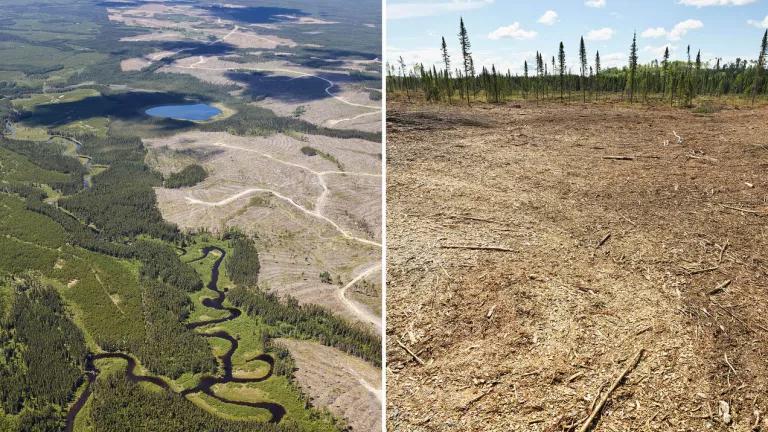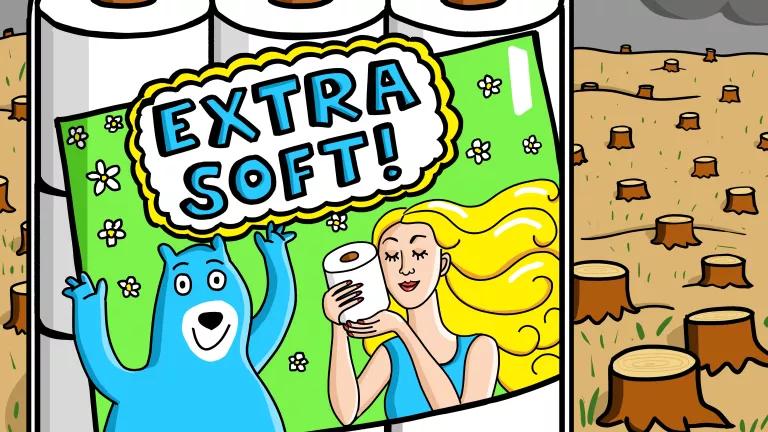How Shareholders Can Hold P&G to Account on Forests
On Tuesday, October 13th, P&G shareholders, including some of the world's biggest asset managers, will have the chance to vote to hold P&G accountable to eliminating deforestation and intact forest degradation in its supply chain.

Clearcut sections in boreal forest near Dryden in Northwestern Ontario, Canada
River Jordan for NRDC
In Procter & Gamble’s annual shareholder meeting, which happens at noon ET, Tuesday, October 13th, shareholders will have the chance to hold the company accountable for its unsustainable sourcing from forests around the world. There, they will be voting on a measure filed by investor Green Century Equity Fund that calls on the company to eliminate deforestation & intact forest degradation from its supply chain. While this shareholder resolution should be an obvious first step for a company serious about eliminating its impact on deforestation, P&G has publicly opposed the measure. Shareholders now have the opportunity to vote for the company to support its stated values with action.
P&G’s lax forest protection policies are linked to human rights violations, deforestation, and damaging climate impacts. P&G has, for years, been purchasing pulp from threatened boreal caribou habitat and climate-critical intact boreal forest to make tissue brands like Charmin toilet paper and Bounty paper towels (earning them Fs in our sustainability scorecard). The company has also been tied to forced labor and human trafficking through its palm oil suppliers in southeast Asia. Most recently, this has led to an U.S. Customs and Border Protection import ban on one of P&G’s biggest palm oil suppliers, Felda. This has earned the company significant negative press coverage and public scrutiny, including from more than 300,000 concerned citizens, significant pressure in their hometown of Cincinnati, and news outlets like the Financial Times and CBS This Morning.
The negative attention associated with this harmful sourcing could have been avoided, had P&G heeded concerns long raised by NRDC, Rainforest Action Network, Global Labor Justice-International Labor Rights Forum, and many more environmental and human rights groups. For many years, our organizations have called on the company to adopt basic measures to uphold Indigenous and traditional communities’ rights; protect threatened species like the boreal caribou; and reduce their reliance on climate-critical forests, all while operating with transparency and accountability with regard to how they deal with credible evidence of violations.
Unfortunately, P&G has not only failed to adopt strong sourcing policies in light of the concerns we’ve raised, they have also failed to meet existing commitments. For example, while the company committed to having a deforestation-free palm oil supply chain by 2020, they announced last year that they would not meet that deadline. All the while, P&G has denied its own impact and delegated responsibility for enforcing its commitments to third party certifiers and their suppliers, giving far too much leeway to industries known for poor environmental standards and human rights violations. .
In fact, P&G has taken a firm position in opposition to the shareholder proposal put forward by Green Century that would require the company to report on and reduce the deforestation that its operations cause. P&G claims that what it is doing now is enough. By opposing this measure, P&G is saying in effect that they do not need to answer the question of how quickly they could stop fueling deforestation, even as investors see the clear risks of their current approach and the failures of their supply chains has never been clearer.
A recent investor brief from NRDC and others outlines the fact that P&G’s current sourcing practices create reputational, competitive, material and regulatory risks that the company is not addressing. An investigative piece by the Associated Press documented with heartbreaking detail how palm oil suppliers like Felda engage in forced labor and human trafficking. At the same time, the company has doubled down on current practices, announcing a new climate commitment this summer, branded the “It’s Our Home,” that does nothing to address its upstream emissions from the forests it is currently sourcing from.
NRDC and others have been meeting with P&G’s biggest shareholders to discuss the proposal and our findings about the company’s practices. We have had conversations with investors that hold roughly $90 billion in equity in the company. We joined a webinar led by Stand.earth, Rainforest Action Network, and Friends of the Earth US to highlight our concerns with P&G’s current approach.
It is up to P&G’s investors, including the biggest asset managers like BlackRock, Vanguard, and State Street, to hold P&G to account. One thing is clear from our conversations: investors care about P&G’s actions, and will be watching the company’s approach to sustainability very closely. For P&G, this means it’s time for them to recognize the impact their sourcing has on the planet and communities, and start taking measures to meaningfully protect our shared home.
Are you a P&G shareholder? Find out how to vote your shares here.




